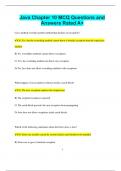CONTRACT LAW REVIEW NOTES
PRIVITY OF CONTRACT
- Privity of contract is a legal doctrine that stipulates that only parties
who are directly involved in the contract can enforce its terms and
obligations.
- It means that a third party who is not a party to the contract cannot
enforce its terms or benefit from it.
Parties Privy to a Contract:
- The parties privy to a contract are the original parties who have
entered into the agreement.
- For example, in a contract between a buyer and a seller, only the
buyer and the seller are privy to the contract.
Third Party Rights:
- Generally, third parties do not have rights under a contract unless they
are specifically named in the contract or are intended beneficiaries.
- However, the Contracts (Rights of Third Parties) Act 1999 allows for
certain circumstances where third parties can enforce a contract.
Intended Beneficiaries:
- In some cases, a contract may be intended to benefit a third party,
known as an intended beneficiary.
,- The third party must be specifically named in the contract and must be
able to show that the contract was intended to benefit them.
Assignment of Contract Rights:
- A party to a contract may assign their rights under the contract to a
third party.
- The third party, known as the assignee, steps into the shoes of the
original party and can enforce the terms of the contract against the
other party.
Novation of Contracts:
- Novation is a process by which one party to a contract is replaced by a
new party, with the consent of all parties involved.
- It effectively releases the original party from their obligations and
transfers them to the new party.
Exception to Privity of Contract:
- There are certain exceptions to the rule of privity of contract, such as
agency relationships where an agent can enforce a contract on behalf of
their principal.
- Also, contracts for the benefit of a trust, where the trustees can
enforce the contract on behalf of the beneficiaries.
Privity in Employment Contracts:
,- In the context of employment contracts, privity applies between the
employer and the employee.
- However, in cases of discrimination or unfair dismissal, third parties
such as trade unions or regulatory bodies may be able to enforce rights
on behalf of the employee.
Remedies for Breach of Privity:
- If a party breaches the terms of a contract, only the parties privy to
the contract can seek remedies for the breach.
- Remedies may include damages, specific performance, or rescission of
the contract.
Real-Life Examples of Privity of Contract in UK Contract Law
a) Tweddle v Atkinson (1861)
- In this case, the father of the groom entered into a contract with the
father of the bride to pay a sum of money to the groom.
- However, when the father of the groom passed away, the father of the
bride refused to pay the money as he was not a party to the contract.
- The court held that the father of the bride was not liable to pay the
money as he was not a party to the contract.
, b) Beswick v Beswick (1968)
- In this case, a nephew entered into a contract with his uncle to
transfer certain properties to the nephew's wife after the uncle's death.
- After the uncle passed away, the nephew's wife attempted to enforce
the contract, but the court held that she did not have privity of contract
and could not enforce the terms.
c) Dunlop Pneumatic Tyre Co Ltd v Selfridge & Co Ltd (1915)
- In this case, Dunlop entered into a contract with a retailer, Selfridge, to
sell its products at a specific price.
- Selfridge then entered into a contract with a third party to sell the
products at a lower price, breaching the original contract with Dunlop.
- Dunlop sued Selfridge for breach of contract, but the court held that
Dunlop did not have privity of contract with the third party and could
not enforce the terms against them.
PRIVITY OF CONTRACT
- Privity of contract is a legal doctrine that stipulates that only parties
who are directly involved in the contract can enforce its terms and
obligations.
- It means that a third party who is not a party to the contract cannot
enforce its terms or benefit from it.
Parties Privy to a Contract:
- The parties privy to a contract are the original parties who have
entered into the agreement.
- For example, in a contract between a buyer and a seller, only the
buyer and the seller are privy to the contract.
Third Party Rights:
- Generally, third parties do not have rights under a contract unless they
are specifically named in the contract or are intended beneficiaries.
- However, the Contracts (Rights of Third Parties) Act 1999 allows for
certain circumstances where third parties can enforce a contract.
Intended Beneficiaries:
- In some cases, a contract may be intended to benefit a third party,
known as an intended beneficiary.
,- The third party must be specifically named in the contract and must be
able to show that the contract was intended to benefit them.
Assignment of Contract Rights:
- A party to a contract may assign their rights under the contract to a
third party.
- The third party, known as the assignee, steps into the shoes of the
original party and can enforce the terms of the contract against the
other party.
Novation of Contracts:
- Novation is a process by which one party to a contract is replaced by a
new party, with the consent of all parties involved.
- It effectively releases the original party from their obligations and
transfers them to the new party.
Exception to Privity of Contract:
- There are certain exceptions to the rule of privity of contract, such as
agency relationships where an agent can enforce a contract on behalf of
their principal.
- Also, contracts for the benefit of a trust, where the trustees can
enforce the contract on behalf of the beneficiaries.
Privity in Employment Contracts:
,- In the context of employment contracts, privity applies between the
employer and the employee.
- However, in cases of discrimination or unfair dismissal, third parties
such as trade unions or regulatory bodies may be able to enforce rights
on behalf of the employee.
Remedies for Breach of Privity:
- If a party breaches the terms of a contract, only the parties privy to
the contract can seek remedies for the breach.
- Remedies may include damages, specific performance, or rescission of
the contract.
Real-Life Examples of Privity of Contract in UK Contract Law
a) Tweddle v Atkinson (1861)
- In this case, the father of the groom entered into a contract with the
father of the bride to pay a sum of money to the groom.
- However, when the father of the groom passed away, the father of the
bride refused to pay the money as he was not a party to the contract.
- The court held that the father of the bride was not liable to pay the
money as he was not a party to the contract.
, b) Beswick v Beswick (1968)
- In this case, a nephew entered into a contract with his uncle to
transfer certain properties to the nephew's wife after the uncle's death.
- After the uncle passed away, the nephew's wife attempted to enforce
the contract, but the court held that she did not have privity of contract
and could not enforce the terms.
c) Dunlop Pneumatic Tyre Co Ltd v Selfridge & Co Ltd (1915)
- In this case, Dunlop entered into a contract with a retailer, Selfridge, to
sell its products at a specific price.
- Selfridge then entered into a contract with a third party to sell the
products at a lower price, breaching the original contract with Dunlop.
- Dunlop sued Selfridge for breach of contract, but the court held that
Dunlop did not have privity of contract with the third party and could
not enforce the terms against them.










